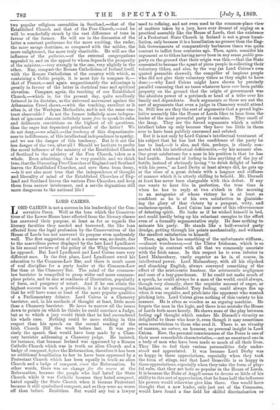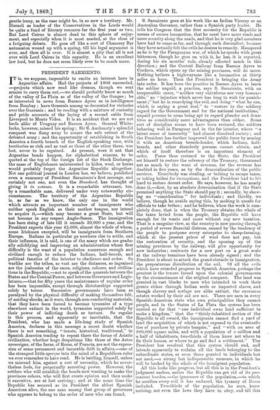LORD CAIRNS.
LORD CAIRNS is not a success in his leadership of the Con- servative Peers. Well as the loan which the Conserva- tives of the Lower House have effected from the literary classes has answered their purpose, at least as far as regards the literary faculties they needed and borrowed, the like loan effected from the legal profession by the Conservatives of the House of Lords has not answered its purpose even moderately well. The first suggestion of such a course was, no doubt, due to the marvellous power displayed by the late Lord Lyndhurst in his annual reviews of the policy of the Whig Governments he opposed. But Lord Lyndhurst and Lord Cairns were very different men. In the first place, Lord Lyndhurst owed his education to the Common-Law Bar, and there is much more of real discipline for a party leader at the Common-Law Bar than at the Chancery Bar. The mind of the common- law barrister is compelled to grasp wider and more common- place points, and to aim at readiness of illustration, popularity of form, and pungency of retort. And if he can attain the highest success in such a profession, it is a fair presumption that he will have some at least of the more popular qualities of a Parliamentary debater. Lord Cairns is a Chancery barrister, and, in his methods of thought at least, little more than a Chancery barrister. He loves to narrow all the issues clown to points on which he thinks he could convince a Judge, but as to which a jury would think that he had surrendered his whole case. Nothing could be more striking in this respect than his speech on the second reading of the Irish Church Bill the week before last. It was pre- cisely the speech that would have been made by a Chan- cery barrister addressing a Chancery judge. He insisted, for instance, that because Ireland was oppressed by a Roman Catholic Church which was in truth an alien Church and a badge of conquest, before the Reformation, therefore it has been no additional humiliation to her to have been oppressed by a Protestant Church which has been equally in truth an alien Church and a badge of conquest, since the Reformation. In other words, there was no change for the worse at the Reformation, because the people who had hated the State Church while it was Catholic because they hated conquest, hated equally the State Church when it became Protestant because it still symbolized conquest, and so they were no worse off than before. Doubtless. But would any but a lawyer used to refining, and not even used to the common-place view of matters taken by a jury, have ever dreamt of urging on 8. practical assembly like the House of Lords, that the existence- of a Protestant State Church in Ireland is not a gross humi- liation, only because it is a humiliation no grosser than the Eng- lish Governments of comparatively barbarous times was quite. content to inflict four centuries ago. Then, again, consider his argument as to tithes having never been in any sense public pro- perty en the ground that their origin was this,—that the State consented to become the agent of pious people in collecting their voluntary tithes, and also, by the way (as Lord Cairns's own quoted preamble showed), the compeller of impious people who did not give their voluntary tithes as they ought to have- done ;—why Lord Cairns might have shown by precisely parallel reasoning that no taxes whatever have ever been public property on the ground that the origin of government was. the absolute power of a patriarch or head of a tribe over his- family and dependents. Such arguments as these are not the sort of arguments that even a judge in Chancery would attend to. Still less are they the sort of arguments that a proud legis- lative assembly like the House of Lords likes to hear from the- leader of the most powerful party it contains. They smell of the lamp. They are the forced arguments which a subtle intellect takes up only because they have too little in therm ever to have been publicly canvassed and refuted.
But it is not-only by Lord Cairns's intellectual treatment or his subject that he has lost the confidence of the party he- has to lead,—it is also, and this, perhaps, is closely con- nected with his intellectual deficiencies,—by his manner also. One great misfortune for a man in his position is that he has.. bad health. Instead of feeling in him anything of the joy of" battle, instead of obviously loving "to drink delight of battle- with his peers," as Lord Derby at least always did, he gets up. at the close of a great debate with a languor and stiffness- of manner which it is utterly chilling to behold. Mr. Disraeli at least has never been chargeable with this defect. If any- one wants to hear him in perfection, the true time is- when he has to reply at two o'clock in the morning to an antagonist.: of whose victory he is at least as- confident as he is of his own satisfaction in diminish- ing the glory of that victory by a pungent, witty, an& audacious speech. Lord Cairns has none of this effervescence- of debating spirit. He looks as if he wished himself in bed, and could hardly bring up his reluctant energies to the effort. even of a formally argumentative reply. He does nothing to. animate his party. He stands like a half-wearied party- drudge, getting through his points mechanically, and without. the smallest satisfaction to himself.
Then, again, he has something of the unfortunate stiffness,. —almost woodenness,—of the Ulster Irishman, which is so. curiously in contrast with all that we commonly associate- with the Irish name. In this respect he is even inferior to- Lord Malmesbury, vastly superior as he is, of course, in, intellectual power. Lord Malmesbzuy, with all his slipsho& and slouching English, always conveyed something of the- effect of the aristocratic hauteur, the aristocratic negligence- and ease of a lazy guardsman. If he could not make much of a speech, he could always be a man of the world, could always, though very clumsily, show the requisite amount of anger, or- indignation, or offended Tory feeling, could always fire up. when it was requisite, and pitch into the opponent who wanteds pitching into. Lord °alma gives nothing of this variety to his. manner. He is often as wooden as an arguing machine. He- forgets the man in the logic, and there is no mistake the House- of Lords feels more keenly. He shows none of the play between feeling mad thought which renders Mr. Disraeli's vivacity so. delightful to those who hear it, even though it may sometimes seem meretricious to those who read it. There is no vivacity- of manner, no nature, no humour, no personal insight in Lord. Cairns. Now, the personal consciousness of the Peers is one of their most remarkable characteristics,—not an unnatural one in a body of men who have been made so much of all their lives._ They like to feel their various personalities duly under- stood and appreciated. It was because Lord Derby was. so happy in these appreciations, especially when they took the form of stings, and that Lord Granville is so happy in these appreciations, especially when they take the form of play- ful rubs, that they are both so popular in the House of Lords. It is because the Duke of Argyll seems to devote so little of his ability to this sort of appreciation, that he loses half the influence- his powers would otherwise give him there. One would have thought that a new leader, only just out of the Commons, would have found a fine field for skilful discrimination or gentle irony, as the case might be, in so new a territory. Mr. Disraeli as leader of the Conservatives in the Lords would be quite a fund of literary resource for the first year or two. But Lord Cairns is almost dead to this sphere of enjoy- ment, and especially when it is most needed, at the close of a fatiguing debate. He goes off like a sort of Chancery Bar automaton wound up with a spring, till his legal argument is over, and then all is over. It is almost a pity that all is not over with Lord Cairns in this capacity. He is an excellent law lord, but he does not seem likely ever to be much more.































 Previous page
Previous page